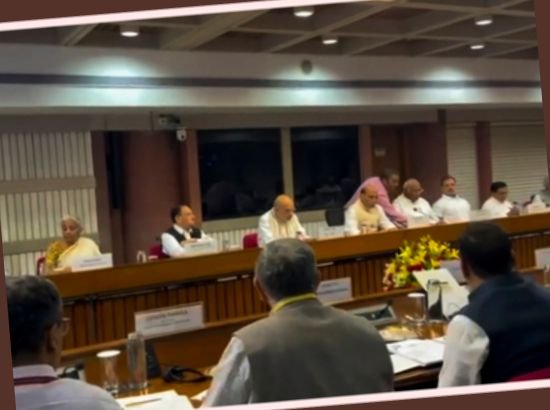
In the all-party meeting convened by the central government on April 24, 2025, following the Pahalgam terror attack in Jammu and Kashmir that killed 26 tourists, the government briefed political leaders on the details of the attack and the immediate response taken. Here are the key points discussed and communicated by the government during the meeting:
Government’s Briefing and Position
The government informed all-party leaders that the Pahalgam attack was orchestrated “to vitiate the country’s atmosphere” and disrupt the peace, especially at a time when Jammu and Kashmir was witnessing economic growth and a revival in tourism.
Defence Minister Rajnath Singh, along with Home Minister Amit Shah and other senior ministers, detailed the sequence of events and the government’s actions, as decided in the Cabinet Committee on Security (CCS) meeting.
Intelligence Bureau and Union Home Ministry officials provided an overview of ongoing and future measures to prevent such incidents, emphasizing the government’s commitment to strengthening security and acting firmly against terrorism and its supporters.
The government reiterated its “zero-tolerance” policy towards terrorism and expressed its intention to take even more stringent action in response to the attack.
Political Unity and Support
Leaders from across the political spectrum unequivocally condemned the terror attack and expressed solidarity with the government in the fight against terrorism.
All parties assured the government of their full support for any action taken against the perpetrators, including those operating from across the border.
The sentiment of national unity was underscored, with leaders stating, “We all are united, and take action,” and pledging to rise above party lines in this crisis.
Discussion on Security Lapses
Several opposition leaders, including Congress president Mallikarjun Kharge, raised concerns about “security lapses” that allowed the attack to occur.
The government acknowledged there were lapses in security and intelligence, noting that local authorities had opened the Baisaran area without proper coordination or informing security agencies, which contributed to the vulnerability.
It was explained that the deployment of security forces depends on information provided by local authorities and tour operators, and in this case, such communication was lacking.
The opposition urged for accountability and corrective action to address these lapses and prevent future incidents.
Opposition’s Response and Suggestions
While supporting the government’s anti-terror efforts, the opposition called for even stronger action against terror networks and their camps, including those across the border in Pakistan.
Congress leader Mallikarjun Kharge and others suggested that Prime Minister Narendra Modi should have attended the meeting to directly hear the opposition’s viewpoints.
There was consensus that efforts must continue to maintain peace and stability in Jammu and Kashmir, and that the government’s response should be robust and transparent.
Conclusion
The all-party meeting concluded with a strong, unified message: all political parties support the government’s actions against terrorism and expect strict measures to be taken against those responsible for the Pahalgam attack. The government acknowledged concerns about security lapses, promised corrective steps, and reaffirmed its commitment to national security and the fight against terrorism.